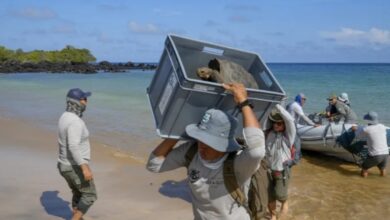Penguin advocates close down a mine in Chile
The mine was located in the city of La Higuera threatening the population of penguins of Humboldt

Leer en Español: ¿Por qué unos pingüinos cerraron una mina en Chile?
After intense discussions that divided the country, the Committee of Ministers banned the project of Dominga. The decision was made due to the risk of affecting the Humboldt penguins who only live in Chile and the South of Peru.
Dominga project had an investment of US$2.500 million dollars that was hoping to bring jobs to one of the poorest areas of the country
The final decision had a strong opposition, not only in the Mining sector, but also from the people of La Higuera. According to AFP, the Dominga project, which belonged to the Andes Iron Company, was planning to invest around US$2.500 million dollars while bringing jobs to one of the poorest areas of the country.
The Dominga project was planning on creating 2 open-pit mines to extract 12 million tons of steel and 140 thousand tons of copper over the next 22 years.
Earlier on this year, Liesbeth Van der Meer, executive director of Oceana NGO, said to Radio Universidad de Chile that the mining project had several illegalities. According to Van der Meer, the project would be located 30 kilometers south of the Choros island, place where the penguins nest. Thus, many ships will be sailing near the National Park affecting the animals.
According to the environmental organizations, the closeness of the mine to the National Reserve “Humboldt Penguins” can affect the food of the animals. On the isle of Los Choros used to live nearly the 80% of the world’s penguins.
Penguins are in danger
Penguins are threaded by climate change and these types of mining projects. Also, scientist around the world warned that the penguin population is in danger due to the reduction of the Antarctica.
In 2015, a research of the Pew Charitable Trust organization warned that two thirds of the 18-different species of penguins is decreasing. The American organization also explained that the increase of the temperature in the oceans affects the availability of fish; the destruction of their breeding sites also has negative effects on their future.
Last week, the environmental organization Greenpeace alerted that there had been found 40.000 Adelie penguins dead in the Antarctica. This was the second time in the last 50 years where many penguins have died due to climate change. In 2013, a similar number of newborns animals passed away due to the lack of ice making it almost impossible for their parents to feed them.
Last week 40.000 of Adelie penguins were found dead in the Pretel Island east from the Malvinas islands
Greenpeace is asking for the creation of a special protection zone near the Antarctica in the hopes to prevent any more unnecessary deaths.
Latin American Post | Santiago Gómez Hernández
Copy edited by Susana Cicchetto





